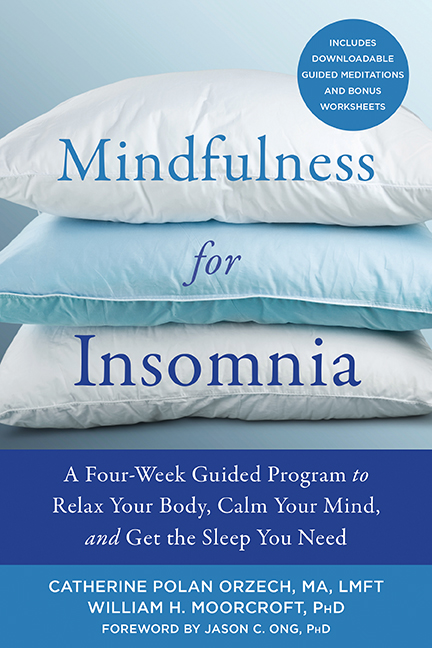By Catherine Polan Orzech, MA, LMFT, coauthor of Mindfulness for Insomnia
If you’re like millions of us, you’re probably not. Did you know…
• The average person in the United States today sleeps 20% less than they did 100 years ago.
• More than 30% of the US population suffers from insomnia.
• People who suffer from sleep deprivation are 27% more likely to become overweight or obese.
• A National Sleep Foundation poll shows that 60% of people have driven while feeling sleepy in the past year—and 37% admit to having fallen asleep at the wheel.
So, how can we get more sleep? Creating an external environment that’s conducive to sleep can help. Making sure our bedrooms are dark, quiet, and cool, as well as following a regular sleep schedule and banning screens from the bedroom, all lead toward more restful slumber. But focusing only on the external environment is not enough. We also need to address the internal environment.
But we can’t just make ourselves fall asleep. You can lie in bed telling yourself go to sleep, but it is the particularly maddening nature of insomnia that the more you try to bully yourself into going to sleep, the more your mind and body seem to rebel. If you’ve ever laid down with a toddler trying to wait them out at a scheduled naptime, you know. No amount of commanding or pleading can make the child fall asleep.
What we can do, however, is create the conditions, internally as well as externally, that make sleep more likely to happen when you do lie down. You can allow natural sleep to come by working mindfully and compassionately with your mind and your body.
In Mindfulness for Insomnia, we lead you through a behavioral treatment of insomnia that helps you do just that. Based on years of helping people with insomnia in our clinical practices, the Guided Mindfulness with Acceptance Treatment for Insomnia (GMATI) program, with its accompanying guided audio meditations and written information, focuses on developing mindfulness and self-compassion throughout the day. Rather than trying to directly change their sleep, we help people suffering from insomnia learn how to be more accepting of their experience when having difficulty sleeping. This may seem paradoxical, and yet this willingness to accept the experience of poor sleep can result in fewer struggles, less anxiety, and then greater levels of calm, beneficial sleep.
The key to this innovative approach is the emphasis on changing your relationship with your sleep just as it is by using mindfulness meditation with an emphasis on self-compassion. As you settle into this new relationship with sleep rather than sleep being a struggle, you will begin to notice an improvement in the quality and then the quantity of your sleep. You will also find that you have things like more alertness and energy during waking hours, improved emotions, and better cognitive skills. All of this can usually be accomplished in a matter of weeks if you are diligent in working on it.
This gentle training in encountering life in this way is like stopping a war—the exhausting war with life that we all wage by unconsciously grasping and resisting, trying to make life different than it is. This war is waged in our own minds and bodies, and it wreaks havoc on our well-being—including our ability to sleep. Each time your mind creates catastrophic stories about the future because of how frustrated you are about not sleeping, you are continuing this internal war. The brain interprets that train of thinking as a threat and reactivates the stress response.
To really rest, we need to feel safe and at peace. Humans are programmed that way: our cave-dwelling ancestors survived because they kept one eye open for saber-toothed tigers. Mindfulness and self-compassion practice can give us that experience of peace because it’s a peace that does not depend on an absence of difficulty. We can learn to encounter ourselves and our lives with acceptance and compassion, and in doing so, bring about the conditions where we can let go into rest.
 Catherine Polan Orzech, MA, LMFT, has taught mindfulness since 2000. She received her initial training in mindfulness-based stress reduction (MBSR) at the Center for Mindfulness at the University of Massachusetts Medical Center, and her professional training under the direction of Jon Kabat-Zinn. She is certified to teach MBSR and mindful self-compassion (MSC). She has taught and lectured on the subject of mindfulness internationally, and was founder and codirector of the Montreal Center for Mindfulness. Catherine is currently an instructor in the departments of psychiatry and OB-GYN at Oregon Health & Science University, where she’s involved in research on mindfulness and women’s health. Her program on mindful and compassionate parenting is currently the subject of research at the University of Oregon. Catherine currently lives in Corvallis, OR, where she is a marriage and family therapist in private practice specializing in mindfulness-based psychotherapy focusing on individuals, couples, and families.
Catherine Polan Orzech, MA, LMFT, has taught mindfulness since 2000. She received her initial training in mindfulness-based stress reduction (MBSR) at the Center for Mindfulness at the University of Massachusetts Medical Center, and her professional training under the direction of Jon Kabat-Zinn. She is certified to teach MBSR and mindful self-compassion (MSC). She has taught and lectured on the subject of mindfulness internationally, and was founder and codirector of the Montreal Center for Mindfulness. Catherine is currently an instructor in the departments of psychiatry and OB-GYN at Oregon Health & Science University, where she’s involved in research on mindfulness and women’s health. Her program on mindful and compassionate parenting is currently the subject of research at the University of Oregon. Catherine currently lives in Corvallis, OR, where she is a marriage and family therapist in private practice specializing in mindfulness-based psychotherapy focusing on individuals, couples, and families.


 2024 Peace Playbook: 3 Tactics to Avoid Clashes with Your Partner
2024 Peace Playbook: 3 Tactics to Avoid Clashes with Your Partner